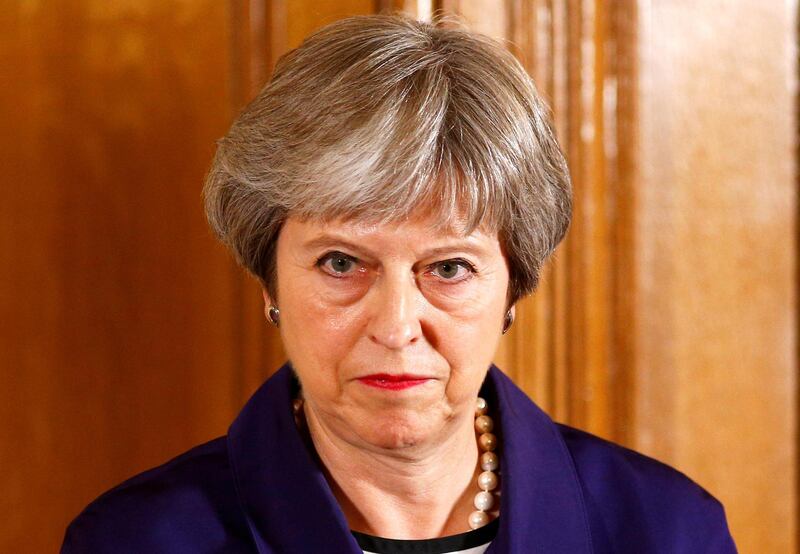The UK premier Theresa May on Monday attempted to shrug off bitter infighting within her own government and insisted the European Union would have to take “seriously” Britain’s new proposals to leave the world’s largest trading bloc.
The prime minister was warned by the EU’s chief Brexit negotiator Michel Barnier at a summit in Brussels last week that time was running out to reach a deal with the bloc after two previous plans on future trading arrangements were rejected by factions within her party.
Leader of the opposition Jeremy Corbyn told parliament that divisions within the ruling Conservative party had made reaching such a deal an unlikely prospect.
Earlier on Monday reports in the British media said Downing Street had proposed a third model for handling customs with the EU in an attempt to break the deadlock on her divided government’s Brexit policy.
The customs union, which currently negates the need for customs checks between the Republic of Ireland and Northern Ireland, has proven to be a major sticking point in the Brexit talks.
Mrs May has said she does not want to see border checks reintroduced in Ireland. But her two previous suggestions for avoiding such a border have proved unpopular with segments of her own party as well as in Brussels.
_______________
Read more:
Brexit: UK running out of time to do deal, says EU’s chief negotiator
Delay the date of Brexit, says former UK leader Tony Blair
_______________
The first option- known as “max fac”- would rely on technology to remove the need for physical customs checks at the border. It has been dismissed by the EU as well as the UK government’s tax body HMRC, who said it the plan would cost businesses up to £20 billion (Dh96.3 billion) per year.
The second option- believed to be the prime minister’s preferred choice- is a “customs partnership”, which would see the UK collecting tariffs on non-EU imports on Brussel’s behalf. This has been resisted by Brexiteers within the Conservative Party including foreign secretary Boris Johnson who said it would create “a whole new web of bureaucracy”.
Senior advisers have stressed that both options will remain on the table when Mrs May meets her warring cabinet at her country estate Chequers on Friday. The meeting is an attempt to agree a negotiation position ahead of publishing a government policy paper next week.
The divisions in her party were plain to see on Monday as a thinly-veiled threat of rebellion from leading Brexiteer Jacob Rees-Mogg drew sharp rebukes from senior Conservatives.
Writing in the Daily Telegraph, Mr Rees-Mogg said if Mrs May did not “stand firm for what she herself has promised”, she could end up being forced out of government in the same way a 19th century prime minister did when he opted to repeal the Corn Laws.
“One former Tory leader, Sir Robert Peel, decided to break his manifesto pledge and passed legislation with the majority of his party voting the other way,” Mr Rees-Mogg said. “This left the Conservatives out of office for 28 years.”
The comments were criticised on Twitter by foreign office ministers Alistair Burt and Sir Alan Duncan.
“Enough,” said Middle East minister Mr Burt in response to the article. “Just tired of this endless threat and counter threat. Why don’t we want the best for the U.K. than for our own ideological cliques? And there are others in this negotiation as far as I’m aware?”
😳Enough. Just tired of this endless threat and counter threat. Why don’t we want the best for the U.K. than for our own ideological cliques? And there are others in this negotiation as far as I’m aware? https://t.co/bPL517qt3p
— Rt Hon Alistair Burt (@AlistairBurtUK) July 1, 2018
His foreign office colleague Sir Alan, commented: “Rees-Mogg’s insolence @Telegraph in lecturing & threatening PM is just too much. Risks debasing govt, party, country & himself. PM must be given maximum latitude & backing. The ideological right are a minority despite their noise & should pipe down. #totalsupportforMay&UK.”
On Sunday it was revealed that Britain’s National Health Service (NHS) was making preparations in case the UK exits the EU without a trade agreement.
NHS England chief executive Simon Stevens told the BBC that planning had taken place to ensure a supply of medicine and equipment was still available if no deal is agreed.
"Nobody's pretending this is a desirable situation, but if that's where we get to it will not have been unforeseen," he told the broadcaster.







